Regulation
Biden’s SAB 121 crypto veto remains intact as House override fails

The U.S. House of Representatives failed to override President Joe Biden’s veto of a crypto measure aimed at reversing a controversial SEC rule, a vote that underscores the ongoing debate over how to police the fast-evolving digital asset industry.
SAB 121: The crux of the controversy
Staff Accounting Bulletin 121 At the heart of this political fight is the Securities and Exchange Commission’s (SAB) SAB 121 rule. The rule requires public companies to be transparent about the management and risks associated with protecting consumers’ crypto assets. While critics say the law creates unnecessary operational challenges and could stifle innovation in the cryptocurrency industry, supporters say it is absolutely vital for investor safety.
See more
Today’s vote in the House to override the President’s veto of SAB 121 CRA demonstrated bipartisan support, but ultimately fell short of the required 2/3 majority.
The following statement is attributed to @BlockchainAssn CEO @KMSmithDC: pic.twitter.com/NSPOni57Sd
— Blockchain Association (@BlockchainAssn) July 11, 2024
THE House of Representatives Vote 228 to 184 The two-thirds majority required to override the president’s veto was not reached. Notably, twenty-one Democrats broke party lines to help Republicans overturn SAB 121, proving that the issue transcends mere political boundaries.
Total crypto market cap at $2.04 trillion on the daily chart: TradingView.com
The regulatory landscape remains unchanged
SAB 121 will remain in place if the veto is not overturned, thus preserving the current regulatory landscape for Bitcoin custody and disclosure. The outcome underscores the difficulties the crypto industry faces in obtaining regulatory relief, even though reform has bipartisan support.
The vote also signals how the Biden administration is approaching cryptocurrency legislation, prioritizing financial stability and investor protection over industry concerns about regulatory burdens. This strategy is consistent with SEC Chairman Gary Gensler’s continued push to include cryptocurrencies within the current legal framework.
Looking ahead: The evolution of cryptocurrency regulation
With the dust settled on this congressional battle, attention now turns to possible future actions. The cryptocurrency industry and its advocates in Congress may seek other avenues to address their problems, perhaps through new legislation or continued pressure on regulators.
The outcome of this vote shows that, despite growing industry interest and investment, major changes in bitcoin control may be difficult to implement. It also highlights the dynamics of interaction between political processes, financial control and technical innovation in the United States.
The debate over appropriate regulation is likely to remain contentious as the bitcoin market grows, with policymakers and authorities facing continued challenges balancing innovation with investor protection in the years to come.
Featured image of The Bulwark, chart by TradingView
